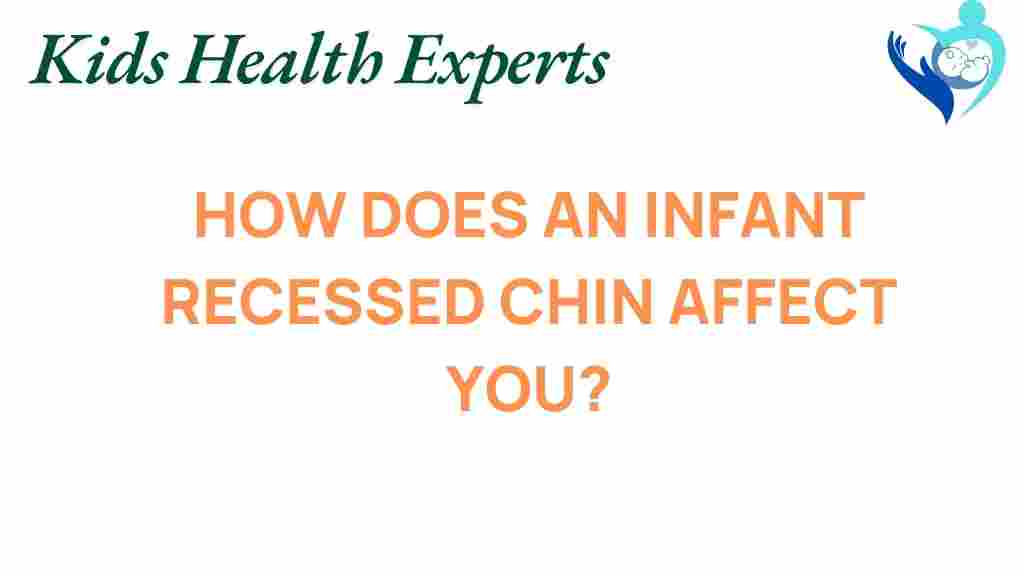The Hidden Impact of an Infant’s Recessed Chin on Development
When it comes to infant health, many parents focus on nutrition, physical growth, and emotional bonding. However, the structure of a child’s face, particularly a recessed chin, can significantly affect various developmental aspects. In this article, we will explore how a recessed chin influences child development, speech, and self-esteem, as well as the importance of pediatric care and early intervention.
Understanding Recessed Chin
A recessed chin, also known as micrognathia, refers to a condition where the chin is positioned further back than normal, which can alter the overall facial structure. This condition may be apparent at birth and can be associated with various genetic and environmental factors. Understanding the implications of a recessed chin is crucial for parents and caregivers.
Impact on Infant Health and Development
The impact of a recessed chin on infant health and child development can be profound. Here are some key areas affected:
- Feeding Difficulties: Infants with a recessed chin may struggle with breastfeeding or bottle-feeding, leading to inadequate nutrition.
- Speech Development: A recessed chin can affect the positioning of the tongue and lips, making it challenging for children to articulate sounds correctly.
- Facial Asymmetry: Over time, the facial structure may develop asymmetrically, potentially leading to aesthetic concerns and self-esteem issues.
How Recessed Chin Affects Speech Development
One of the most significant impacts of a recessed chin is on speech development. As children grow, their ability to communicate effectively is essential for social interaction and academic success. Here’s how a recessed chin can contribute to speech challenges:
Mechanics of Speech Production
Speech production involves the coordination of the tongue, lips, and jaw. A recessed chin can hinder this coordination, resulting in:
- Difficulty in pronouncing certain sounds, particularly labials and alveolars.
- Increased risk of speech delays or disorders.
- Potential for developing improper speech habits.
Early Intervention Strategies
Identifying and addressing speech issues early can mitigate long-term consequences. Here are some strategies for parents:
- Consult a Pediatrician: Early assessment by a healthcare professional can help understand the severity of the condition.
- Speech Therapy: Engaging a speech-language pathologist can provide targeted exercises to improve articulation.
- Family Involvement: Encouraging family interactions can create a supportive environment for language development.
Facial Structure and Self-Esteem
The influence of a recessed chin on self-esteem cannot be overlooked. As children grow, their awareness of physical appearance increases. A recessed chin can lead to:
- Bullying and Social Stigma: Children may face teasing or bullying from peers, which can impact their social interactions.
- Body Image Issues: Concerns about facial appearance can lead to anxiety and dissatisfaction with their looks.
- Impact on Relationships: Children may struggle to form friendships due to low self-esteem stemming from their facial structure.
To combat these issues, parents should focus on fostering a positive self-image in their children through:
- Positive Reinforcement: Complimenting children on their abilities rather than their appearance.
- Encouraging Open Conversations: Allowing children to express their feelings about their appearance can help them process their emotions.
- Seeking Professional Help: If self-esteem issues persist, consider consulting a child psychologist.
Pediatric Care and Recessed Chin
Pediatric care plays a vital role in managing the effects of a recessed chin. Regular check-ups can help monitor development and address concerns promptly.
Regular Assessments
Parents should ensure their child receives regular pediatric assessments, focusing on:
- Growth Measurements: Monitoring height, weight, and head circumference to ensure healthy growth patterns.
- Developmental Milestones: Tracking speech, motor skills, and social interactions.
- Dental Evaluations: Consulting a pediatric dentist can help identify any potential dental issues early.
Importance of Early Intervention
Early intervention is crucial for addressing the challenges associated with a recessed chin. Here’s how to approach early intervention:
- Be Proactive: If you notice feeding or speech difficulties, consult a pediatric professional immediately.
- Follow Recommendations: Adhere to the advice of healthcare providers regarding therapy and interventions.
- Build a Support Network: Connect with other parents experiencing similar challenges to share resources and support.
Troubleshooting Tips for Parents
As a parent, navigating the challenges of a recessed chin can be overwhelming. Here are some troubleshooting tips to help address potential issues:
Addressing Feeding Difficulties
- Use Specialized Bottles: Consider using bottles designed for babies with feeding difficulties.
- Consult a Lactation Consultant: They can provide strategies for improving breastfeeding techniques.
- Monitor Weight Gain: Keep track of your baby’s weight to ensure they are feeding adequately.
Improving Speech Skills
- Engage in Play-based Learning: Use games and songs to encourage speech development.
- Read Together: Reading to your child can promote language skills and vocabulary development.
- Practice Sounds: Work on specific sounds that may be challenging for your child.
Boosting Self-Esteem
- Encourage Extracurricular Activities: Participation in sports or arts can build confidence.
- Model Positive Self-Talk: Demonstrate how to speak positively about oneself.
- Celebrate Achievements: Acknowledge your child’s accomplishments, big or small.
Conclusion
The impact of a recessed chin on an infant’s development is significant and multifaceted. From feeding challenges to speech development and self-esteem issues, understanding the implications of this condition is crucial for parents and caregivers. By prioritizing pediatric care and early intervention, parents can help their children navigate these challenges effectively.
Always remember, the earlier you seek help, the better the outcomes for your child. If you are concerned about your infant’s health or development, don’t hesitate to consult with a healthcare professional.
For more insights on child development and health, visit this resource.
Additionally, for further reading on the importance of early intervention, check out this article.
This article is in the category Conditions and created by KidsHealthExperts Team
